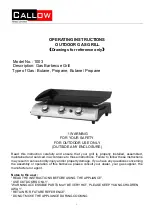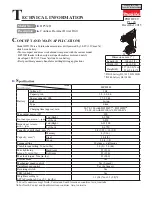
3
Original Instructions
tool or these instructions to operate the power tool.
Power tools are dangerous in the hands of untrained
users.
■
Maintain power tools and accessories. Check for
misalignment or binding of moving parts, breakage
of parts and any other condition that may affect the
power tool’s operation. If damaged, have the power
tool repaired before use.
Many accidents are caused
by poorly maintained power tools.
■
Keep cutting tools sharp and clean.
Properly
maintained cutting tools with sharp cutting edges are
less likely to bind and are easier to control.
■
Use the power tool, accessories and tool bits etc.
in accordance with these instructions, taking into
account the working conditions and the work to
be performed.
Use of the power tool for operations
different from those intended could result in a hazardous
situation.
■
Keep handles and grasping surfaces dry, clean
and free from oil and grease.
Slippery handles and
grasping surfaces do not allow for safe handling and
control of the tool in unexpected situations.
BATTERY TOOL USE AND CARE
■
Recharge only with the charger specified by the
manufacturer.
A charger that is suitable for one type
of battery pack may create a risk of fire when used with
another battery pack.
■
Use power tools only with specifically designated
battery packs.
Use of any other battery packs may
create a risk of injury and fire.
■
When battery pack is not in use, keep it away from
other metal objects, like paper clips, coins, keys,
nails, screws or other small metal objects, that can
make a connection from one terminal to another.
Shorting the battery terminals together may cause burns
or a fire.
■
Under abusive conditions, liquid may be ejected from
the battery; avoid contact. If contact accidentally
occurs, flush with water. If liquid contacts eyes,
additionally seek medical help.
Liquid ejected from
the battery may cause irritation or burns.
■
Do not use a battery pack or tool that is damaged or
modified.
Damaged or modified batteries may exhibit
unpredictable behaviour resulting in fire, explosion or
risk of injury.
■
Do not expose a battery pack or tool to fire or
excessive temperature.
Exposure to fire or temperature
above 130°C may cause explosion.
■
Follow all charging instructions and do not charge
the battery pack or tool outside the temperature
range specified in the instructions.
Charging
improperly or at temperatures outside the specified
range may damage the battery and increase the risk of
fire.
SERVICE
■
Have your power tool serviced by a qualified repair
person using only identical replacement parts.
This
will ensure that the safety of the power tool is maintained.
■
Never service damaged battery packs.
Service
of battery packs should only be performed by the
manufacturer or authorized service providers.
HAMMER DRILL SAFETY WARNINGS
SAFETY INSTRUCTIONS FOR ALL OPERATIONS
■
Wear ear protectors when impact drilling.
Exposure
to noise can cause hearing loss.
■
Use the auxiliary handle(s).
Loss of control can cause
personal injury.
■
Hold the power tool by insulated gripping surfaces,
when performing an operation where the cutting
accessory or fasteners may contact hidden wiring.
Cutting accessory or fasteners contacting a “live” wire
may make exposed metal parts of the power tool “live”
and could give the operator an electric shock.
SAFETY INSTRUCTIONS WHEN USING LONG DRILL BITS
■
Never operate at higher speed than the maximum
speed rating of the drill bit.
At higher speeds, the bit is
likely to bend if allowed to rotate freely without contacting
the workpiece, resulting in personal injury.
■
Always start drilling at low speed and with the bit
tip in contact with the workpiece.
At higher speeds,
the bit is likely to bend if allowed to rotate freely without
contacting the workpiece, resulting in personal injury.
■
Apply pressure only in direct line with the bit and do
not apply excessive pressure.
Bits can bend causing
breakage or loss of control, resulting in personal injury.
ADDITIONAL SAFETY WARNINGS
■
Clamp workpiece with a clamping device. Unclamped
workpieces can cause severe injury and damage.
■
Dust created by operating the product can cause
respiratory injury. Wear appropriate dust control mask
with filters suitable for protecting against particles from
the material being worked on.
■
Injuries may be caused, or aggravated, by prolonged
use of a tool. When using any tool for prolonged periods,
ensure you take regular breaks.
■
Switch off the product immediately if the bit stalls. Do
not switch on the product again while the bit is stalled,
as doing so could trigger a sudden recoil with a high
reactive force. Determine why the bit stalled and rectify
this, paying heed to the safety instructions.
The possible causes may be:
–
it is tilted in the workpiece
–
it has pierced the workpiece
–
the product is overloaded
■
Ambient temperature range for tool during operation is
between 0 ˚C and 40˚ C.
■
Ambient temperature range for tool storage is between
0 ˚C and 40˚ C.
■
The recommended ambient temperature range for the
charging system during charging is between 10 ˚C and
38˚ C.
ADDITIONAL BATTERY SAFETY WARNINGS
■
To reduce the risk of fire, personal injury, and product
damage due to a short circuit, never immerse your
tool, battery pack or charger in fluid or allow a fluid to
flow inside them. Corrosive or conductive fluids, such
as seawater, certain industrial chemicals, and bleach
or bleach-containing products, etc., can cause a short
Summary of Contents for RPD18X
Page 1: ...FRONT PAGE RPD18X...
Page 6: ...6 Getting started 1 3 2 2 22 1 2 1 3 4 6 2 5 3 20210331v1b...
Page 7: ...7 Operation 1 2...
Page 9: ......
Page 10: ......
Page 11: ......






























